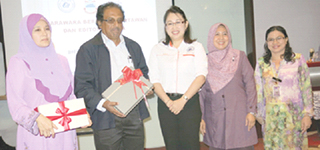Editor: Fake news may also impact coming polls
Published on: Thursday, December 08, 2016

Kota Kinabalu: The possibility of "fake news" in social media influencing the coming Malaysian general election, as had happened in the recent US presidential election, cannot be dismissed, a newspaper editor warned. Daily Express Chief Editor, James Sarda drew attention to the bombardment of fake news in the closing stages of the election that is now said to have contributed to the defeat of Hillary Clinton, and making many world leaders from Germany's Angela Merkel to French and Italian politicians now worried as they prepare for their respective electoral battles. "This (fake news) was never a problem when social media first took hold but has now become a major problem, as people now tend to prefer social media than newspapers for their information since it is free and instant," he said.
ADVERTISEMENT
Even Facebook founder mark zuckerberg acknowledged that his powerful medium had been abused in the US presidential race since 52pc of Americans formed their opinions on the candidates purely via Facebook. "Initially he (mark) said the possibility of fake news deciding votes was just 1pc. But what that 1pc could be in Facebook terms is mind boggling. " All it takes is for one person to place a 'like' on certain information regardless of whether its true on his or her Facebook page which is instantly accessible to millions in cyberspace who then also register their 'likes'. Like the supposed suicide of the FBI personnel involved in investigating Hillary's email scandal at the election's 11th hour which although debunked as untrue, was too late."
ADVERTISEMENT
Speaking on the Challenges facing the Print Media Industry at the Luncheon Talk for the Print and Electronic Media at Grandis Hotel, Sarda said : "If 'fake news' had such an impact on the American election, what about the coming Malaysian election?
ADVERTISEMENT
We don't know yet. But the public must be alert to social media being manipulated and abused by people with certain agenda. "If this can happen in the US and the Google and Big Data bosses cannot control it apa lagi (what more) Malaysia." Sarda noted that even Myannar blamed 'fake news' for the diplomatic tension with Malaysia over the Rohingya people's alleged persecution and the man who took two guns into a pizza outlet in Washington and started shooting when someone falsely reported on facebook that the outlet was a haunt for paedophiles. He said precisely because of this development, there is a possibility that people may turn away from getting their news on social media and going back to reading newspapers again for accurate information. Sarda also cited several examples of fake news that made the social media rounds lately, including the supposed passing of former Prime Minister Tun Dr Mahathir Mohamad from heart failure in Germany with the source of the information traced to a certain "Telegraph TV". Sarda said he wished the Government would be responsive to these new developments and equip the media with the tools to do a better job including at being the watchdog for the people. He said for a long time, calls to amend the Official Secrets Act (OSA), for instance, so that it's purpose is only confined to national security matters, have not been heeded. He said the Act, as it stands now, also covers contracts and tender awards, so much so when millions of ringgit were found to be allegedly misappropriated as in the recent Sabah water scandal, among the questions being asked was how come the media did not know about it. "It is my belief that a scandal of such proportions would not have been possible if we had a more practical OSA plus legislation such as a 'Freedom of Information Act' to demand that the department disclose the nature of all its contracts, the money and the contractors involved, including whether the shareholders also appear in bidding for other water contracts through different firms. "But at present this is not possible because all the documents like water contracts are chopped sulit (confidential) and to publish them would subject us to law suits." He said with a FOI Act in place all a journalist needs is to ask the Minister or department head to disclose the relevant information and failure to do so can compel the newspaper to drag the Minister or department head to court for concealing information from the public."Surprisingly, the State Legislative Assemblies of Selangor and Penang who are members of the opposition bloc have introduced FOI and is now used to query transactions." This way journalists can be strategic partners with the Government to ensure the public gets the correct information and help minimise corruption and abuse. According to Sarda, the Malaysian Official Secrets Act (OSA) 1972 was tightened by then Prime Minister, Tun Dr Mahathir Mohamad following the RM1 billion Bank Bumiputra scandal, resulting in media practitioners ever since then having to operate with their hands literally tied behind their backs. Stay up-to-date by following Daily Express’s Telegram channel.
Daily Express Malaysia




